As this year’s session of the Synod on Synodality gets underway in Rome, South African women and women religious have reached new levels of frustration with the church and Pope Francis himself.
Theologian and spiritual director Annemarie Paulin-Campbell said Pope Francis has been a superb leader in many respects.
“However,” she said, “when it comes to the issue of women’s ordination, he seems to have already made a decision and does not seem open to discerning this issue.”
There have been two Vatican commissions on women’s ordination to the diaconate—in 2016 and 2020—but their reports have not been made public.
“Where is the transparency in this?” Ms. Paulin-Campbell asked. “It is difficult to feel that these have not simply been a patronizing attempt to pacify women.”
She described “a deep sense of disillusionment that the church, on the one hand, is saying we need to be a synodal listening church, and has yet again, it seems, on the other hand, taken the diaconate for women off the table.”
This “severely undermines the whole idea of listening and journeying together,” Ms. Paulin-Campbell said.
High hopes for the Synod
There had been high hopes that the Synod on Synodality would address this issue concretely.
It was on the agenda for the first sitting in October 2023, but the discussion has been removed from the agenda for the second sitting of the synod, taking place this month.
Ms. Paulin-Campbell said that Pope Francis’ remarks in an interview in May with U.S. media – reaffirming that women will never be ordained deacons – has “broken the last thread of hope many women were holding onto, and some have decided to leave now.”
Biddy-Rose Tiernan, S.N.D.deN. (pictured), one of South Africa’s best-known and loved religious women, said that she keeps asking why there seems to be such a deep-seated fear among the ordained men leading the Roman Catholic Church.
“Is it power? Is it insecurity? So many women are well-educated in theological, scriptural and historical matters.”
“Jesus was revolutionary in his inclusion of all as disciples and friends,” Sister Tiernan said. “I keep looking for reasons why there is this reluctance or fear and refusal because when I understand the reason behind any decision, I am better able to accept it.”
“It would be interesting to hear what’s behind Pope Francis’ turnaround regarding [the discussion of the] diaconate for women,” said Cathy Murugan, H.F. “I’m disappointed in Francis because I believed the synod was about discussing previously ‘unmentionable issues.’”
She said that she does not believe that God’s call is “selective and prejudicial.” Sister Murugan said that by excluding women from “responding fully to God’s call…the church is doing violence to women.”
Nontando Hadebe, a member of the Circle of Concerned African Women Theologians and Catholic Women Speak/Preach, said that women’s equality is central to both continental and national priorities: “Africa leads the world with the highest number of female parliamentarians.
In Rwanda, for example, 60 percent are women.” She said that “the church [in Africa] stands alone and disconnected.”
“But there is also another facet to this,” Ms. Hadebe said, referring to “the lack of a grassroots, visible, active movement among Catholic women in Africa for women’s diaconate.”
Many women in Africa are “disconnected and isolated from their global sisters within and outside the church advocating for women’s rights.”
African Catholic women found some consolation in comments made by Archbishop Buti Tlhagale, the archbishop of Johannesburg, South Africa, who warned bishops of southern Africa of a “deep down” anger among some women because “we have excluded them from ordination.”
Prejudice against women
During a sermon at a plenary session of the Southern African Catholic Bishops’ Conference in August, Archbishop Tlhagale told the bishops that, despite the continuing overall support for the church among women, “priests and bishops don’t necessarily have a good reputation [with them].”
Archbishop Tlhagale said that prejudice against women is a sin that should be included among others “when you are going to confess.”
He pointed out that the church readily accepts women into its congregations, and they are “in fact, the majority in any community…. Yet, somehow, there is an inbuilt prejudice against women among the Catholic clergy, and I don’t think we’re going to do much about it now.” Read more
- Russell Pollitt, S.J., is America Magazine’s Johannesburg correspondent.
